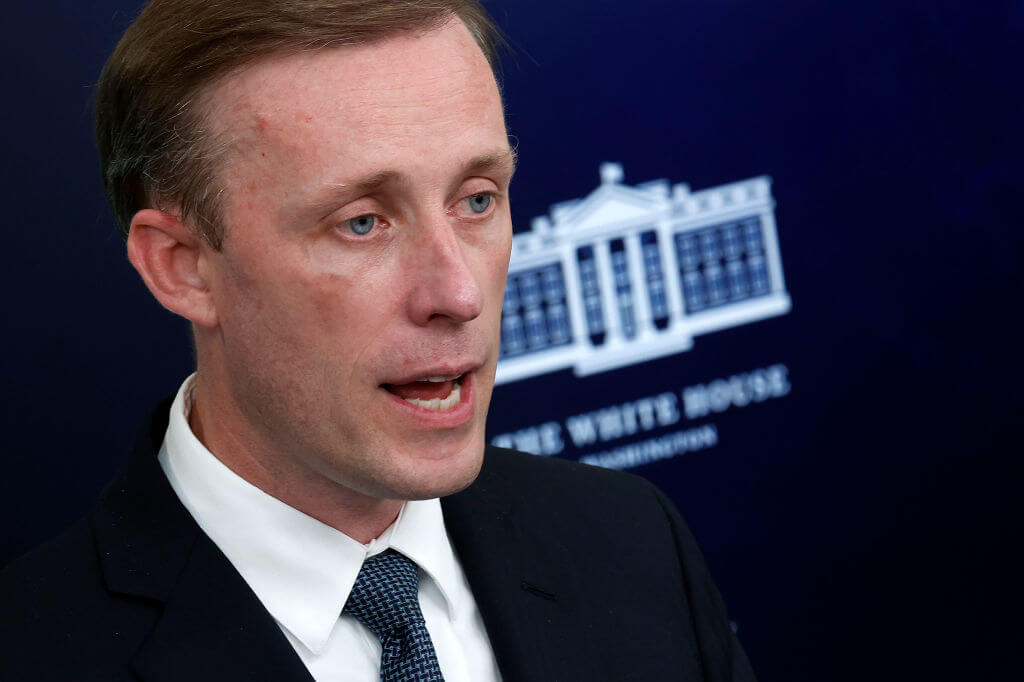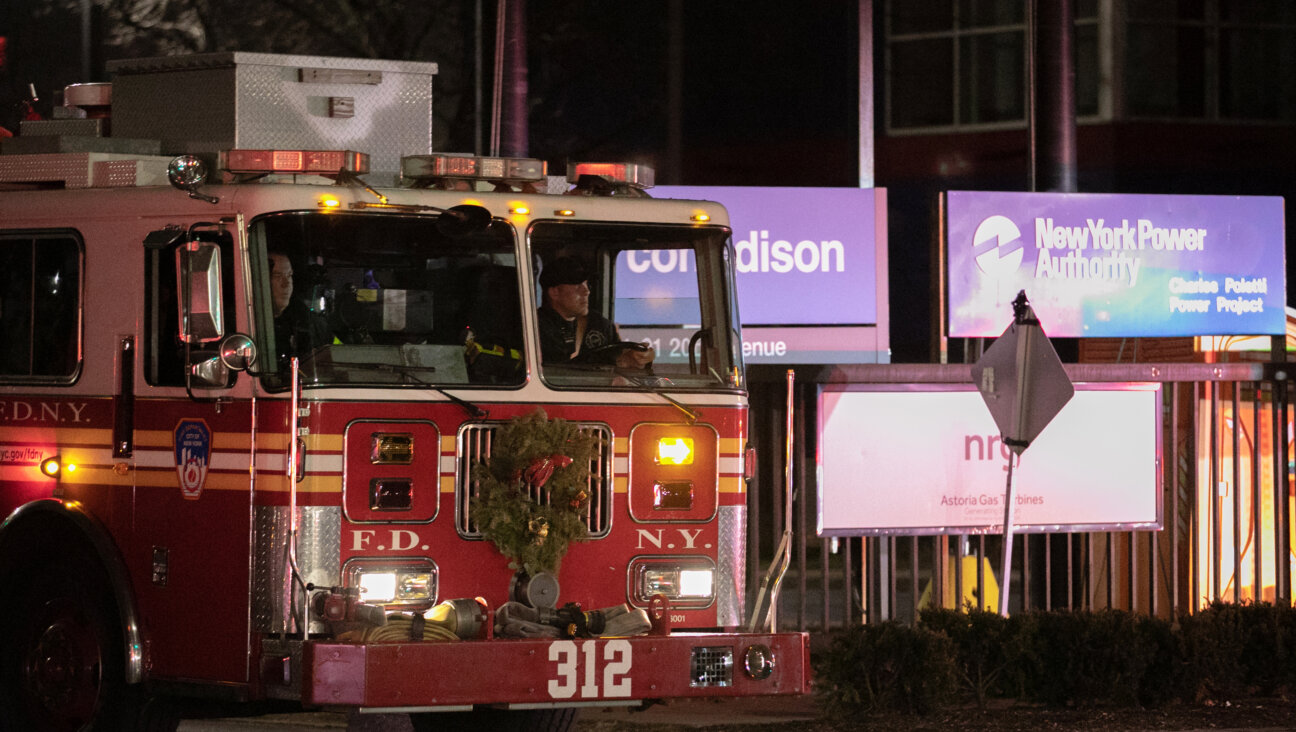In HBO’s ‘And Just Like That’ finale, a ‘they mitzvah’ challenges Jewish traditions

The Goldenblatt family gathers with Rabbi Jen, played by Hari Nef, on the finale of HBO’s “Sex and the City” reboot. (Screenshot)
(JTA) — Spoiler alert: This story contains details from “Seeing the Light,” the season finale of HBO’s “And Just Like That,” which first aired Feb. 3, 2022.
(JTA) — The previews for the season finale of “And Just Like That,” the “Sex and the City” reboot airing on HBO, suggested that viewers would get to see a “they mitzvah.”
And for most of the episode, which began streaming Thursday, that’s exactly what seemed like was happening. Charlotte (Kristin Davis), who converted to Judaism in the original series, is busy arranging the details for a gender-neutral Jewish coming-of-age ritual for her younger child, who recently began using “they” pronouns.
The family’s approach is in line with how many Jews and Jewish communities are handling bar and bat mitzvah, the Jewish transition to adulthood that happens at age 13 (or 12 for girls in some communities). The name of the milestone is traditionally gendered, so boys become bar mitzvah and girls become bat mitzvah.
But as awareness and acceptance of gender identities beyond male and female have accelerated, many communities have sought to frame the milestone in an inclusive way. Some use the abbreviation “b mitzvah” for all children; others have held “b’nei mitzvah,” using a Hebrew plural word, for just one child. Using the pronoun adopted most widely by people who identify as nonbinary, Charlotte is planning a “they mitzvah” for Rock (Alexa Swinton).
Charlotte — a consummate traditionalist — and her Jewish husband Harry (Evan Handler) seem both delighted and disquieted by recasting the ritual for their child.
They buy up rainbow-themed kippahs and decorations for the party and hire a transgender rabbi (played by Jewish transgender actress Hari Nef) to work with Rock. “Who better to lead a ‘they’ mitzvah than a trans rabbi?” Charlotte exclaims. “It’s bashert [destiny]!”
But when their friend Anthony, the proprietor of Hot Fellas Baked Goods, suggests going with sourdough challah loaves — “Behold! Chot-fellas challah,” he announces, with an exaggerated “ch”— Harry balks.
“It’s hipster challah,” he says. “We’re already pushing the envelope with this ‘they’ mitzvah. Can we please give the old Jew something they’ll recognize?”
Perhaps the most significant departure from the traditional bar or bat mitzvah is that the family appears not to belong to a synagogue at all. Instead, the Goldenblatts are seen working with freelance rabbis to plan an event on their own. This path is being taken by more and more families who want to mark their children’s maturity within the Jewish tradition but who, like the vast majority of Jewish adults in America, are not members of a particular synagogue.
The family also appears to be planning on an unusually condensed timeline. While children typically prepare for months or even years to read from the Torah for the first time, help lead services and give a speech to their community, Rock cycles through multiple rabbis just weeks before the planned ceremony.
Rabbi Jen, the transgender rabbi, takes aim at the timeline when she meets with Charlotte and Harry. “Great kid, totally unprepared, complete disaster,” she tells them about their child, who prefers to play video games than prepare. (This may be the most conventional aspect of the family’s experience.) She adds, “Moving forward with the current plan is not realistic. They simply haven’t mastered the material.”
“But it’s next Saturday,” Charlotte says. “What do you suggest we do?”
The rabbi suggests that Rock reads only two lines from their Torah portion (“That would be upsetting,” Charlotte responds), or that Rock conducts the entire service in English.
“No, I did not convert to Judaism to have my child be they mitzvahed in English!” Charlotte yells.
In the end, the they mitzvah doesn’t happen — because as it turns out, gender is not the only identity that Rock is working through.
“I’m not doing it. I don’t believe in it,” Rock tells their parents, the guests already assembled in the hotel ballroom where the they mitzvah is set to take place.
“Believe in what?” Rock’s parents exhort, offering expensive gifts if only the day would move forward as planned.
“I don’t want to be labeled as anything. Not as a girl. Or a boy. Or Nonbinary. A Jew. A Christian. Muslim. Or even” — and this prompts gasps — “a New Yorker!”
“So what, you’re nothing now?!” Charlotte asks.
Rock replies: “I’m only 13! Can’t I just be me?”
The outburst represents perhaps the most significant challenge to Jewish tradition in the episode. Even as the role of synagogues in American Jewish experience has evolved, and even as communities craft new ways to include children who do not identify as boys or girls, the age at which a Jewish child takes on adult responsibilities has remained unchanged. In fact — as certain the mohel character on another TV show pointed out — becoming bar, bat or they mitzvah is automatic depending on a child’s age, not their preparation.
Charlotte doesn’t comment on this. Instead, she laments, “I’ve failed as a mom and I’ve failed as a Jew.” The show is about female friendship, but Charlotte’s longest and more durable friends, absorbed with their own issues, don’t counsel her in the moment. Instead, it’s a newer friend who urges her to stop chastising herself and think about what she really wants to have happen.
“This is not over!” Charlotte announces with fierce determination. “There are 300 people, 130 challahs, a rainbow chai and a trans rabbi. I did not come all this way and do all this work to have it end like this. Someone is going out there and getting they mitzvahed, today!”
But there is no coercion for Rock. Instead, the episode cuts to Charlotte completing the blessing said after reading from the Torah, draped in a tallit and beaming beside Rabbi Jen. The assembled crowd chants, “Amen.”
Carrie (Jewish actor Sarah Jessica Parker) leans over to Miranda (Cynthia Nixon) and, with a whisper, clarifies the situation: It is Charlotte, and not Rock, who has marked a milestone today. “Our little girl is a woman now,” she quips.
“Harry, now that Charlotte has become a bat mitzvah, please come and join us on the bimah,” the rabbi says. “And if anyone else from the family would like to come join us for this next blessing, they are more than welcome.”
The couple’s older daughter jumps to her feet, but Rock moves more slowly. Then, as a clarinetist plays “Oseh Shalom,” they, too, join the family behind the Torah.
—
The post In HBO’s ‘And Just Like That’ finale, a ‘they’ mitzvah challenges Jewish traditions appeared first on Jewish Telegraphic Agency.
The Forward is free to read, but it isn’t free to produce

I hope you appreciated this article. Before you go, I’d like to ask you to please support the Forward.
Now more than ever, American Jews need independent news they can trust, with reporting driven by truth, not ideology. We serve you, not any ideological agenda.
At a time when other newsrooms are closing or cutting back, the Forward has removed its paywall and invested additional resources to report on the ground from Israel and around the U.S. on the impact of the war, rising antisemitism and polarized discourse.
This is a great time to support independent Jewish journalism you rely on. Make a gift today!
— Rachel Fishman Feddersen, Publisher and CEO
Support our mission to tell the Jewish story fully and fairly.
Most Popular
- 1

Fast Forward Ye debuts ‘Heil Hitler’ music video that includes a sample of a Hitler speech
- 2

Opinion It looks like Israel totally underestimated Trump
- 3

Culture Is Pope Leo Jewish? Ask his distant cousins — like me
- 4

Fast Forward Student suspended for ‘F— the Jews’ video defends himself on antisemitic podcast
In Case You Missed It
-

News In Edan Alexander’s hometown in New Jersey, months of fear and anguish give way to joy and relief
-

Fast Forward What’s next for suspended student who posted ‘F— the Jews’ video? An alt-right media tour
-

Opinion Despite Netanyahu, Edan Alexander is finally free
-

Opinion A judge just released another pro-Palestinian activist. Here’s why that’s good for the Jews
-
Shop the Forward Store
100% of profits support our journalism
Republish This Story
Please read before republishing
We’re happy to make this story available to republish for free, unless it originated with JTA, Haaretz or another publication (as indicated on the article) and as long as you follow our guidelines.
You must comply with the following:
- Credit the Forward
- Retain our pixel
- Preserve our canonical link in Google search
- Add a noindex tag in Google search
See our full guidelines for more information, and this guide for detail about canonical URLs.
To republish, copy the HTML by clicking on the yellow button to the right; it includes our tracking pixel, all paragraph styles and hyperlinks, the author byline and credit to the Forward. It does not include images; to avoid copyright violations, you must add them manually, following our guidelines. Please email us at [email protected], subject line “republish,” with any questions or to let us know what stories you’re picking up.















